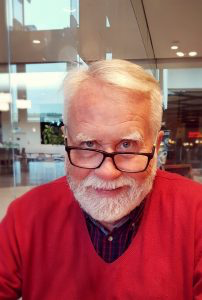By Andrzej Krajewski
Andrzej Krajewski is a former TVP Washington correspondent; and was the adviser on freedom of expression in Poland’s National Broadcasting Council, KRRiT, 2012-2016.

On a snowy February 2019 evening over 150 demonstrators gathered in front of the public television (TVP) building in the centre of Warsaw. We shouted “Shame!”, “Employ journalists!”, and “TVP lies!”. The old theme tune of communist era TV news blared out of loudspeakers as an accompaniment to the protest. A squad of police officers had cordoned off the entrance to the building and was escorting TVP employees as they came out through the angry crowd.
This is an everyday snapshot of what has become of what used to be Polish “public” television three years after the nationalist PiS (Law and Justice) party took power in elections in the autumn of 2015. TVP really has become just a mouthpiece of the current government, and today the “public” label of TV Poland is an empty word. The party’s seizure of almost total radio and TV control was swift and effective. In December 2015 the State Treasury assumed the right to fire the top layer of the station’s management and appoint their own favourites instead. Six months later a brand new body, composed largely of PiS politicians, made the takeover official, but most of the important changes had by then already been made.
In all about 250 journalists and other media professionals were dismissed or shuffled off to backroom office jobs in either TV or radio. Their replacements came almost exclusively from small private, religious and local media. The collective task of the newcomers was to transform “public” television and radio into a state propaganda machine.
Unlike in many other formerly communist countries, in Poland the public broadcaster has been a massively significant institution. And it remains a crucially important actor in the media landscape. TVP has two main channels TVP1 and TVP2, the 24-hour news channel TVP Info, 16 local channels and 6 themed channels (History, Sport, Children etc). The main evening news show, Wiadomości is aired on TVP1. Plenty of high quality programmes are still being produced in parts of the TVP empire, but when it comes to the provision of news and information on Wiadomości and the TVP Info news channel, the situation is irredeemably bad. There is no longer any real pretence of being impartial on issues with political content.
The charge of systematic bias Wiadomości rests on evidence from monitoring of its output as well as that of two private TV companies with national reach. Before the local elections held in autumn 2018 autumn an independent group of Polish journalists known as the Journalistic Society (Towarzystwo Dziennikarskie, or TD) monitored the editorial content of Wiadomości for a month, comparing it with that of the main news programs of two private TV stations, TVN and Polsat, owned by Discovery (US) and Polish tycoon Zygmunt Solorz. On TVP newscasts Law and Justice party politicians, including candidates, accounted for 73 percent of all the politicians’ statements aired during that period. The remaining 27 percent was shared among the various opposition parties, whose statements were generally presented with negative editorial comments: that is to say no balance, no separation of information and editorial opinion, and no hint at all of criticism towards the ruling party.
In other words, it was holistic propaganda. The standard methodology of such media monitoring involves differentiating between on-air election-related materials and other items which are not relevant to the data being collected. In the output of Wiadomości there were virtually no non-electoral materials. Practically every item was slanted in some way to advocate support for pro-government candidates. This is the definition of a propaganda tube.
The chairman of TVP, Jacek Kurski, a former PiS MEP and known sympathizer, has publicly defended the political bias demonstrated by these monitoring results. His argument is that because he considers TVN and Polsat to be propaganda channels of the opposition, the countervailing pro-government stance of TVP maintains the necessary pluralism of the media marketplace.

That argument is untenable. Public broadcaster have certain legal obligations: to observe pluralism, impartiality, balance, and independence. The private broadcaster is not obliged to follow the same strict rules of law, however it should keep the obligations of its licence issued by KRRiT. In any case, Mr Kurski’s assertion that TVN represents the opposition is wrong. TVN is indeed critical of government actions, as any media should be. The public should always be presented with many sources of information and a wide range of opinions so that they can make up their minds about which party to support and to vote for at election times.
Formally, TVP’s performance is supervised by the National Broadcasting Council (KRRiT), but for the past three years that body has ceased to provide proper oversight to ensure due impartiality because it is made up exclusively of supporters of the PiS party. The results of TD’s electoral monitoring were sent to KRRiT, but were studiously ignored. KRRiT replied that they could not recognise any content monitoring carried out by other bodies. They added that after 28 days the broadcaster was not obliged to keep records of its broadcasts so there was no way to check the TD’s findings.
TVP remains the single most watched and most influential source of news and information for the Polish population: the three daily newscasts on TVP’s two main channels are watched by 6,9 m viewers, while TVN and Polsat newscasts by 3.1m and 2.3m (Dec. 2018). In view of its extraordinary influence in shaping public opinion the Journalistic Society (TD) followed up with a second monitoring exercise in early January 2019. This time it counted the relative frequency of appearances on TVP’s Wiadomości of pro-government commentators and those representing other viewpoints. It was found that pro-government voices were heard three times more often than others on TVP’s flagship daily news programme. They included ruling party representatives and some opposition ones, but out of 36 contributors only one was heard speaking out clearly against the programme’s orthodox pro-PiS line. It was apparent that TVP’s news programs consistently call on a small stable of approved experts. One of them spoke six times in one week on a wide range of topics. All were from lesser-known universities or institutions and right wing press titles: so much for pluralism.
In mid-January 2019, soon after the politically motivated murder of Gdansk city mayor, Paweł Adamowicz, Wiadomości accused opposition politicians of using hate speech that might have led to his assassination. It was a disgraceful and absurd charge. Later, evidence was produced showing that it TVP itself, on its local and national channels, in 2018 had aired over 1,600 items about him, including many which included hateful insults and slurs against Adamowicz and other opposition candidates in last year’s elections. The mayor was called “coward”, “pudding” and “a cancer on Polish democracy”. At the time that torrent of unfounded smears had sparked public protests outside TVP offices in many cities, including Warsaw.
Former TVP employees have spoken out publicly about the oppressive working conditions they experienced after the PiS takeover of the public broadcaster. On January 22 Piotr Owczarski, a TV producer who was sacked from TVP, joined Adam Bodnar, Poland’s independent Commissioner for Human Rights, at a hearing of the Committee on Petitions of the European Parliament in Strasbourg. The two men gave damning evidence about the prevalence of hate speech and the crushing of journalistic independence. They also explained that it is now standard practice at TVP that every statement or interview with Mr. Kaczyński, the PiS leader, must be faithfully quoted; and every day fresh directives are handed down from the office of Jacek Kurski, laying down what the main themes of that day’s news should be and sometimes directing that particular opposition politicians are to be hunted to be made the subject of negative stories.
“TVP Info strips you of your humanity, you work as if in a labour camp” said Owczarski in an interview for “Polityka” magazine two weeks later. Part-timers and freelancers are hired to work with very few rights, and can be dismissed at any time; shifts are often 14 hours long, sometimes people are required to work 29 days a month; last year a video editor was summoned back to work again straight after an all-night shift, and he died of a heart attack in a corridor of the TVP building.
The noisy protest and shouts of “shame” on that snowy night were addressed not only at TVP staff and their bosses, but also at stirring Polish public opinion. Falsehoods, propaganda and smear campaigns should have no place in the output of “public service media” anywhere in today’s Europe; especially with European elections only two months away. Will the Polish public and the EU exert the pressure needed to save TVP from a new generation of intolerant propagandists?
So far, the protests in front of the TVP building are still taking place every night and Mr Kurski continues to insist that “TVP journalists tell the truth”.

